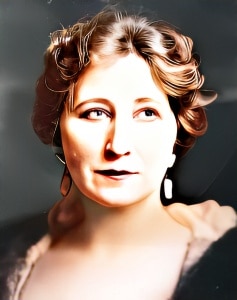 Mary Alden (1883-1946) was an American actress who made a significant impact during the silent film era.
Mary Alden (1883-1946) was an American actress who made a significant impact during the silent film era.
Known for her versatility and ability to portray a wide range of characters, she left a lasting legacy in the early days of cinema.
Born on June 18, 1883, in New York City, Mary Maguire Alden began her acting career on the stage before transitioning to silent films. Her journey in the burgeoning film industry began in the early 1910s when she made her screen debut.
One of the highlights of Mary Alden’s career was her collaboration with pioneering director D.W. Griffith. She appeared in several of his films, including “ The Birth of a Nation” (1915) and “ Intolerance” (1916). In “ The Birth of a Nation,” Alden portrayed the character Lydia Brown, contributing to the film’s complex narrative, which explored themes of the American Civil War and its aftermath. While the film was groundbreaking in terms of cinematic techniques, it has faced criticism for its racist content.
In “ Intolerance,” Alden took on various roles, a testament to her versatility as an actress. The film was known for its ambitious storytelling, portraying multiple narratives throughout history, and Alden’s performances were integral to the film’s success.
Alden continued her collaboration with Griffith in other films, including “Judith of Bethulia” (1914) and “ Home, Sweet Home” (1914). Her ability to portray a variety of characters with depth and authenticity solidified her status as a prominent actress in the silent film era.
One of her memorable roles came in “The Scarlet Letter” (1926), where she played Mistress Hibbins, a character embroiled in the Puritan society of Nathaniel Hawthorne’s novel. Her performance added depth to the story and showcased her ability to adapt to various historical settings.
As the silent film era transitioned into the sound era, Mary Alden faced the challenges of adapting to the evolving industry. She continued to act in both films and television, but her presence in Hollywood gradually diminished over the years.
Mary Alden’s personal life was relatively private, and her acting career remains her most enduring legacy. Her work with D.W. Griffith and her ability to bring authenticity and depth to her characters in various historical and social contexts contributed to the art of early American cinema.
Mary Alden passed away on July 2, 1946, in Woodland Hills, California. Her contributions to the silent film era continue to be celebrated and appreciated for their emotional depth and their role in shaping the early days of cinema. Her performances are considered essential in the history of American film and an enduring testament to the power of storytelling through the medium of film.
Loading live eBay listings...




